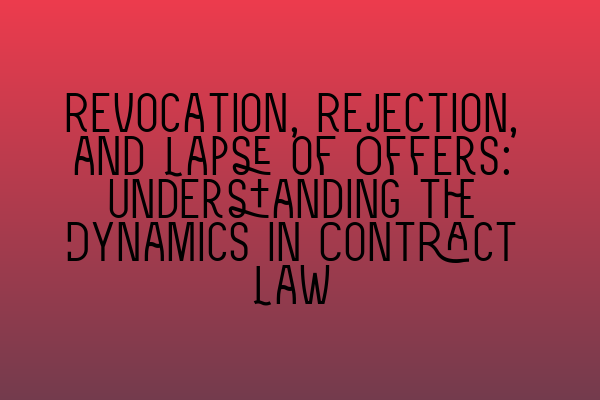Revocation, Rejection, and Lapse of Offers: Understanding the Dynamics in Contract Law
Whether you’re a solicitor, law student, or someone with a general interest in contract law, understanding the dynamics of revocation, rejection, and lapse of offers is essential. These concepts play a crucial role in determining the validity and enforceability of a contract. In this article, we will provide an in-depth analysis of these principles and how they shape the legal landscape.
Revocation of Offers
When it comes to contract law, an offer is a proposal made by one party to another with the intent to create a legal relationship. However, this offer can be revoked or withdrawn before it is accepted. It’s important to note that revocation is only effective when communicated to the offeree. In other words, revocation takes place when the offeror directly informs the offeree that the offer is no longer available for acceptance.
To better understand revocation, let’s consider a common scenario: Alex offers to sell his car to Ben for £10,000. However, before Ben has a chance to accept the offer, Alex decides to revoke it and informs Ben via email. In this case, the revocation is deemed effective as soon as Ben receives the email. It is crucial for the offeror to communicate the revocation clearly to avoid any confusion or misunderstandings.
On the other hand, revocation can be problematic when it takes place simultaneously with the offeree’s acceptance. In such cases, the legal principle of the “postal rule” comes into play. According to this rule, the acceptance takes effect at the time of posting, regardless of when the offeror receives it. This means that if the offeree sends an acceptance at the same time as the offeror sends a revocation, the acceptance is still valid. However, if the acceptance is received after the revocation, it will not create a legal contract.
Rejection of Offers
In addition to revocation, rejection is another fundamental principle in contract law. Rejection occurs when the offeree declines or refuses the offer. Similar to revocation, rejection must be communicated to the offeror to be effective. It is important for the offeree to clearly express their intention not to accept the offer, either verbally or in writing.
Let’s consider a hypothetical situation: Sarah receives an offer from David to purchase her property for £500,000. However, Sarah rejects the offer by sending an email to David explicitly stating her refusal. In this case, the rejection is effective once David receives the email. It is essential for the offeree to communicate their rejection promptly to avoid any uncertainty regarding the status of the offer.
Lapse of Offers
The concept of lapse of offers is applicable when an offer has not been accepted or rejected within a specified timeframe. Essentially, if the offeree fails to respond to the offer within a reasonable period, the offer lapses and becomes invalid. However, what constitutes a reasonable period can vary depending on the circumstances of each case.
For example, if Bob offers to sell his laptop to Alice and specifies that she must respond within one week, the offer will lapse if Alice fails to provide a response within that timeframe. The lapse occurs automatically without any need for explicit communication from either party.
Integrating keywords and enhancing readability:
Understanding the dynamics of revocation, rejection, and lapse of offers is crucial in contract law practice. These principles shape the validity and enforceability of contracts. In this article, we will provide an in-depth analysis of these concepts and their implications.
To gain deeper insights into legal practice and decision-making, click here to access our article on “Unveiling Real-Life Case Studies: Insights into Legal Practice and Decision-Making”. Understanding the application of these principles through real-life examples can enhance your understanding of contract law dynamics.
For solicitors who want to explore the factors affecting their income and average earnings in the UK, we recommend reading our article on “Exploring Solicitor Salaries in the UK: Average Earnings and Factors Affecting Income”. This resource can further your understanding of the financial aspects of being a solicitor.
Additionally, mastering client relationship management is crucial for solicitors to enhance trust and loyalty. To learn the essential skills required for effective client relationship management, refer to our article on “Mastering Client Relationship Management: Skills for Solicitors to Enhance Trust and Loyalty”.
If you’re considering pursuing a law school education in the UK, it’s important to choose the right path for your future. Our article on “Pursuing a Law School Education in the UK: Choosing the Right Path for Your Future” provides valuable insights into the different educational options available and how to make informed decisions.
Lastly, securing training contracts is a vital step in becoming a solicitor. To navigate the process successfully, refer to our comprehensive guide on “Securing Training Contracts: A Roadmap to Becoming a Solicitor”. This resource will help you understand the steps involved and increase your chances of securing a training contract.
In conclusion, revocation, rejection, and lapse of offers are key aspects of contract law that influence the validity and enforceability of contracts. Understanding these principles is essential for solicitors and anyone interested in contract law. By integrating real-life case studies and exploring related topics, we can deepen our understanding and apply these concepts effectively.
